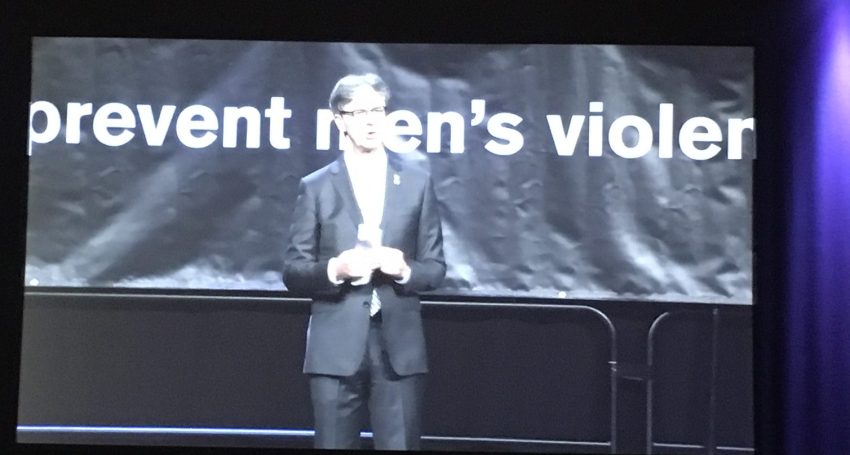Men speaking out against domestic violence
Local
Society needs to look at the way it is “raising boys to be men” if it is to stop the horror of domestic violence, attendees at Adelaide’s 10th annual White Ribbon breakfast were told.

Canadian Michael Kaufman, one of the co-founders of the worldwide White Ribbon campaign, said boys needed to know it was okay to be caring and nurturing and to show their feelings – but that demonstrating anger towards women was not acceptable.
While the 1400-strong audience heard the sobering statistic – that one in three women experienced some form of violence in a relationship – Dr Kaufman provided heartening news that the dynamics in society were changing. en were now joining women to “break the silence” and speak out against the perpetrators of domestic violence.
Advertisement
As he pointed out, they were often just “regular guys”, “the one who might be sitting next to you in the pew at Church, or in the temple or mosque” or someone in your workplace.
“They use it (domestic violence) as a tool to maintain power and control in a relationship,” he explained.
The White Ribbon campaign now operates in 80-90 countries worldwide and Dr Kaufman said events like Adelaide’s “super” breakfast was an opportunity for supporters to help “make waves” and send a powerful message to the community that domestic violence will not be tolerated, and that women and children who are suffering abuse “are not alone”.
Libby Davies, CEO of White Ribbon Australia, congratulated South Australia for being the first state to have all its government workplaces White Ribbon accredited.
Nationwide, the “generational attitudinal and behavioural change” was underway, with more than 200 workplaces covering 800,000 employees being accredited, 500 schools conducting programs, together with the thousands of events held each year to create awareness.
Like many organisations, the Catholic Archdiocese of Adelaide is playing a proactive role in the campaign against domestic violence. Its ‘Safe Environments for All’ program provides a policy framework to ensure the safety and wellbeing of children and young people in the Church community, including identifying indicators of family violence.
Advertisement
“Where there are concerns for abuse and neglect as a result of domestic or family violence, our responding procedure and flowchart provides a process to ensure children are safeguarded and supported either by a notification to statutory services, Department for Child Protection or referred to community services,” said Teresa Lynch, director of the Archdiocese’s Child Protection Unit (CPU).
“The brochure we have developed within the CPU, What can I do if I’m concerned about a child or family – a guide to respond, report, support lists the Domestic Violence Gateway as a contact.
“Child Safe Environments’ training provides an opportunity to analyse case scenarios which specifically focus on family violence. During training we promote the Domestic Violence prevention handbook as a resource to assist clergy and pastoral workers engaging with people who may be impacted,” Ms Lynch added.
Centacare Catholic Family Services, in conjunction with the Port Adelaide Football Club and State Government, has also developed a program to educate boys and young men about domestic violence. The ‘Power to End Violence Against Women’ involves visits to schools where male students are taught about healthy relationships, respect, trust and gender equality, as well as the dangers of abusive behaviour.








Comments
Show comments Hide comments